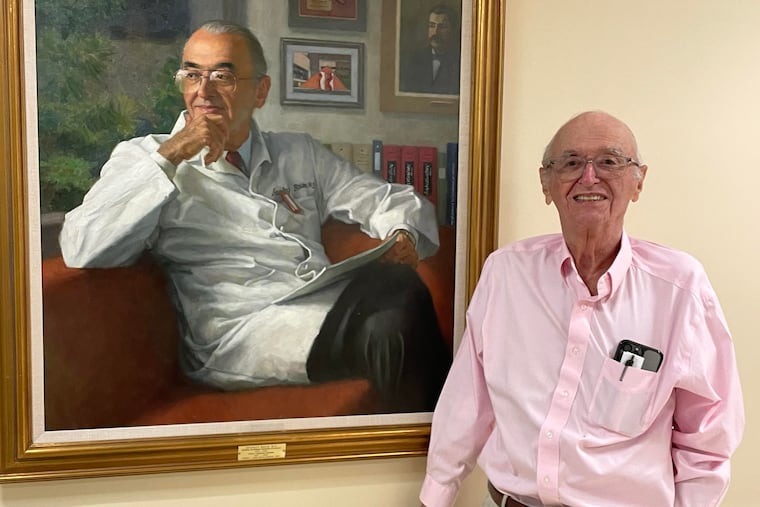Stanley Baum, groundbreaking radiologist, professor emeritus, and longtime department chair at Penn, has died at 92
He was an early proponent of MRIs and other medical imaging devices. “He was a kind, gentle man who believed in service, and the radiology community will miss him tremendously,” a colleague said.

Stanley Baum, 92, of Philadelphia, one of the country’s first interventional radiologists, innovator in medical imaging research and development, and professor emeritus and longtime chairman of the radiology department at the University of Pennsylvania’s Perelman School of Medicine, died Sunday, Oct. 15, of pancreatic cancer at his home.
A visionary in how medical imaging could improve surgical procedures, Dr. Baum was instrumental in organizing the nation’s first hospital-based magnetic resonance imaging program at the Hospital of the University of Pennsylvania in the 1980s. In the 1990s, as a founder and onetime president of the Academy for Radiology & Biomedical Imaging Research, he wrote and helped pass legislation that established the prestigious National Institute for Biomedical Imaging & Bioengineering at the National Institutes of Health.
“Stan’s contributions to radiology are immeasurable,” Penn’s Mitchell Schnall, president of the Academy for Radiology & Biomedical Imaging Research, said in a tribute. Another colleague said: “Stan Baum was truly one of the most outstanding radiologists of his era. He was the epitome of an academic radiologist.”
Chair of Penn’s department of radiology from 1975 to 1996, Dr. Baum, among other things, developed new techniques for studying blood vessels that led to nonoperative treatment of gastrointestinal bleeding. He reorganized the department in the 1970s, was named the Eugene P. Pendergrass professor of radiology in 1977, and Penn established the Stanley Baum professorship of radiology in 2001.
Dr. Baum was a tireless promoter of medical imaging and a founding member and first president of the Society for Cardiovascular and Interventional Radiology. He was a leader for many professional organizations, including the Physicians for Social Responsibility, and the Institute of Medicine, now the National Academy of Medicine.
He wrote papers, edited books, and was editor of the journal Academic Radiology for 17 years. Among his many awards were gold medals from the Academy for Radiology & Biomedical Imaging Research, Radiological Society of North America, and American College of Radiology.
He spoke at meetings and conferences around the world, and held visiting professorships at MD Anderson Hospital in Houston, and Harvard Medical School. He served on Penn’s University Council, Faculty Senate, and other panels. He retired in 2013.
In a tribute, a friend called him “a true mensch who made an enormous contribution to the health of all on a worldwide basis.”
In a recent podcast interview, Dr. Baum said it is important for young radiologists to constantly innovate and improve. “Your practice will grow,” he said, “if the interns and surgeons appreciate that you do work better than anybody else in the institution.”
The native New Yorker was also a civic booster, and he embraced Philadelphia’s cultural, natural, and historical heritage. He worked with other leaders in the 1990s to recruit the best and brightest to study, work and live in the city, and his son Richard said: “He thought Philadelphia has everything to be a world-class city.”
Born Dec. 26, 1929, in the Bronx, Dr. Baum received a bachelor’s degree from New York University and earned his medical degree at the Faculty of Medicine at the University of Utrecht in Holland in 1957. He completed his residency at Penn’s Graduate Hospital, spent a few years working at Stanford University and Massachusetts General Hospital in Boston, and returned to Penn for good in the late 1960s.
A people person, he enjoyed working with patients and avoided too much time in the lab or X-ray dark room. “He was approachable, down to earth, and made connections easily,” his daughter Carol said.
He met Jeanne Masch, his wife of 64 years, through a friend in 1957, and they had son Richard and daughters Laura and Carol. They lived in Chestnut Hill for nearly five decades, and he decorated their home with his favorite house plants and liked to linger out back by a koi pond.
Dr. Baum enjoyed the Philadelphia Orchestra and had season tickets to the Eagles. He was good with his hands and dropped by construction sites at Penn to see how things were built. He was a lively storyteller, played the violin as a young man, started a band, and ran his own dating service while in college.
“Life was an adventure to him, and problems were just something to be solved,” said his daughter Carol. His other daughter, Laura, said: “He provided unconditional love and was an amazing role model to us all.” His son said: “He was bigger than life.”
In a tribute, a colleague said: “He will be missed, but his legacy lives on.”
In addition to his wife and children, Dr. Baum is survived by nine grandchildren, one great-grandson, two sisters, and other relatives.
Services were Oct 21.